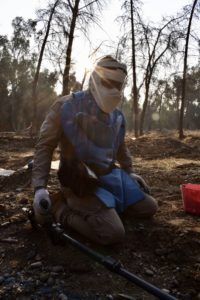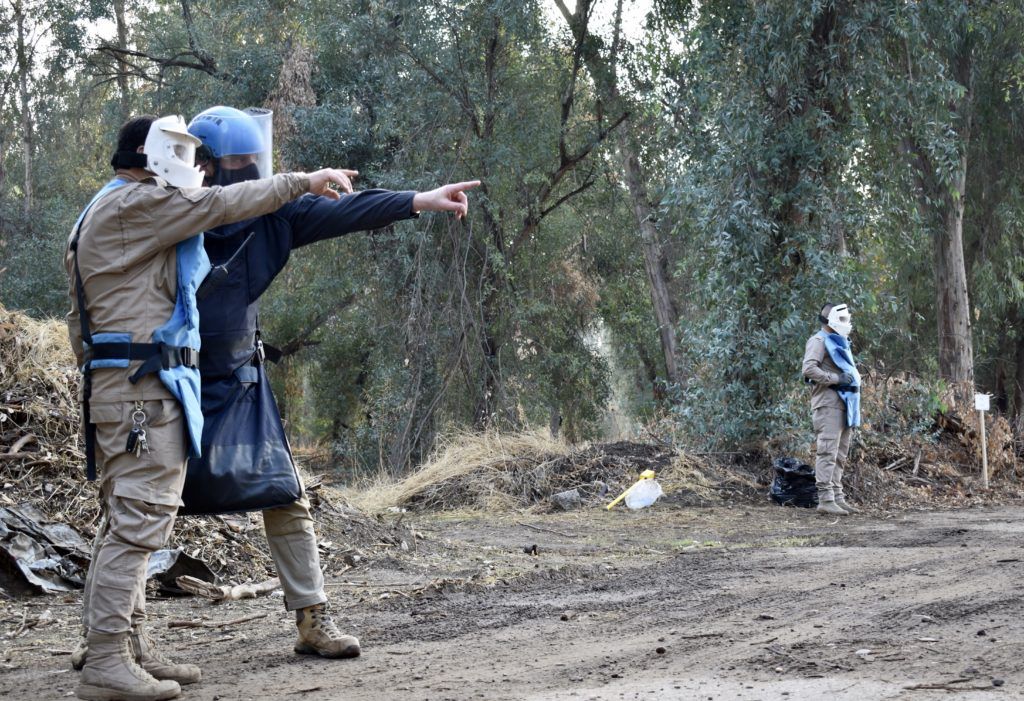 Stories
Stories
April 22, 2021 • 3 min read
From 2014 to 2017, the Iraqi city of Mosul was occupied by ISIS. This brought devastation and destruction to the city's inhabitants.
Shortly after taking control of the city in June 2014, ISIS fighters looted the city’s central bank, destroyed businesses, and forcefully collected money from business owners and farmers to finance their campaigns.
ISIS also took control of agricultural production and equipment and forced farmers to sell their products at lower rates.
The combination of dwindling profits and a volatile security situation led many farmers to stop working in the fields all together. As a result, the city’s economy almost collapsed entirely. With businesses closed down, unemployment levels and poverty rates soared.
Unexploded Ordinances

Humanitarian Mine Action teams from the Danish Refugee Council carry out mine clearance. Mosul, Iraq 2020 – Photo by Cherry Franklin for the Danish Refugee Council
After almost three years under the control of ISIS, the city was liberated. However, the conflict left behind a deadly legacy of unexploded ordnances (bombs known as UXOs) and damaged infrastructure. Today, as the city is rebuilding, large areas of land remain contaminated by UXOs, and many of the cities’ inhabitants still struggle to find sustainable livelihoods to support their families.
Since 2018, the Danish Refugee Council has been working to clear the Al-Ghabat forest in the east of the city with the support of the Swedish International Development Corporation (SIDA). The forest is heavily contaminated with UXOs, and to date, DRC has cleared 152,759 square miles in the area. Through their work they have found mortars, projectiles, RPGs and small arms ammunition.
By reducing the threat posed by UXOs, the clearance project has helped reduce the barriers to people finding sustainable livelihoods. The work that DRC has carried out to clear the Al-Ghabat forest area has made it safe for public use.
It has also allowed GOAL to carry out agricultural projects on the land. Together, these projects have helped restore the forest, provide sustainable livelihood opportunities to residents, and provide the next step towards the city’s long-term rehabilitation.
Rebuilding Mosul
Between May 2020 and January 2021, GOAL carried out work designed to build community resilience in Mosul. This includes improving opportunities for work and enhancing food security.
Participants in the project were employed to help make the Al-Ghabat forest safe. They cleared 10 hectares of forest and prepared the soil for planting trees.
Participants were also employed to construct 12 greenhouses on government-owned land, which were then handed over to local authorities for management and maintenance. GOAL also purchased crops including gourd, eggplant, and green beans to cultivate in the greenhouses.
Along with providing Mosul residents with paid employment, the project has helped rehabilitate Al-Ghabat forest, clearing a space for trees to be planted and crops to grow in the greenhouses.
Now, more than three years since the liberation of Mosul, the last traces of war and destruction in the forest are starting to be cleared away, restoring the area as a safe and flourishing green space in the city.

Humanitarian Mine Action staff oversee the work of colleagues carrying out mine clearance, providing essential safety support. Mosul, Iraq 2020. – Photo by Cherry Franklin for the Danish Refugee Council
